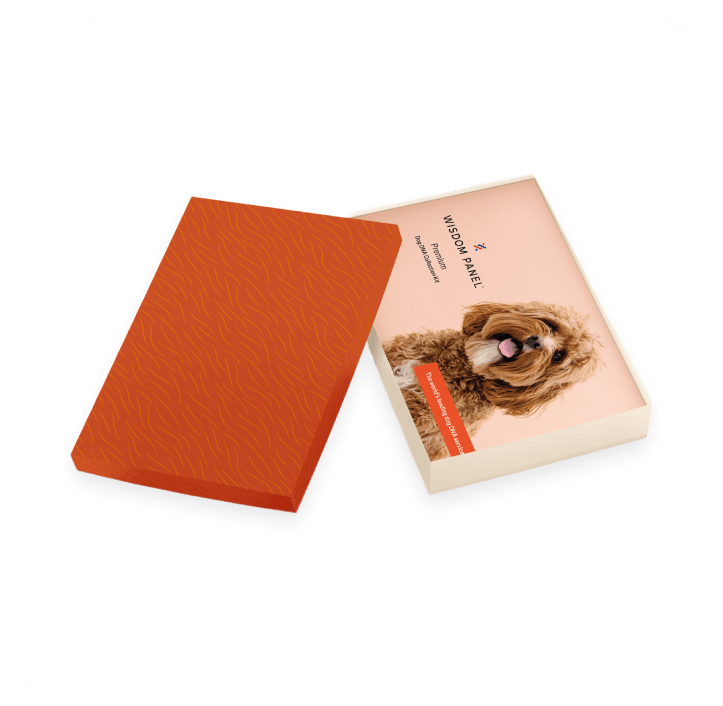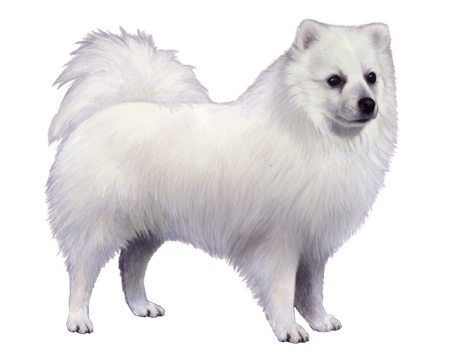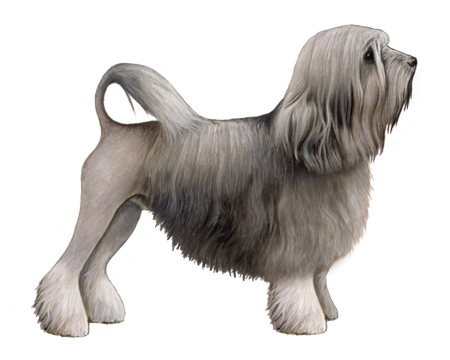
Keeshond
The Keeshond is an alert, intelligent, and playful dog. Once used to guard river barges, this breed sailed its way to popularity as a family pet with a permanent smile on its face.
Interested in discovering if your dog is a Keeshond?
Check out Wisdom Panel's DNA tests.

Keeshond Traits
General Appearance
Keeshonden are handsome with well-balanced proportions, an alert carriage, and fox-like expressions. These are medium-sized, square-appearing dogs with adaptable personalities.
Coat and Coloring
The Keeshond has a thick, soft undercoat and long, straight, harsh hair on its overcoat that stands out from the body. The hair on its head—including the muzzle, skull, and ears—is short and smooth, with a velvet-like texture. Profuse manes (more prominent in males) cover their necks.
The breed's coloring includes a mixture of grey, black, and cream that can vary from light to dark. Their undercoats are pale gray or cream. Puppies have less vivid markings. On the outer coat, the hair is black-tipped, creating the Keeshond's characteristic shading. Their muzzles and ears should be dark in color.
Distinctive Physical Traits
Keeshonden have well-muscled bodies, long, well-feathered tails that curl over their backs, and rounded, cat-like toes. The hair that forms the "pants" on their hind legs is long and feathered. The breed is also known for its spectacles—dramatic markings around their eyes that make it look like they're wearing glasses.
Keeshond Temperament
Keeshonden are known as outgoing, affectionate, and intelligent dogs. Their easygoing dispositions and adaptable natures make them popular family dogs and ideal for a range of living situations—including life aboard a boat.
Though they originated as guard dogs, Keeshonden are neither timid nor aggressive. They are friendly with people and other dogs. These dogs will happily tag along for activities or hang out at home—but they prefer being with their families.


Keeshond History
The Keeshond (pronounced kayz-hawnd) is an Arctic breed related to other spitz-type breeds, such as the Samoyed, Chow Chow, Norwegian Elkhound, and Finnish Spitz. The breed originated sometime between the 17th and 18th centuries. These nimble-footed dogs started working on the boats that floated down Dutch waterways, hopping from ship to shore, guarding river boats and barges, and hunting vermin.
In the 1700s, Keeshonden (the plural of Keeshond) were also symbols of the Dutch Patriots Party and featured in countless political cartoons. No one knows how the breed got its name. There are theories that either prominent Patriots named Kees or a Patriot mascot dog, also called Kees, influenced the name. The political turnover helped bring the breed widespread notice.
The English Breed Club lists these dogs as Keeshonden. However, the breed has different names in other parts of the world, including Wolfspitz in Germany, Chiens Loup in France, and Lupini in Italy.
Keeshond Care
Nutrition
Keeshonden require a high-quality diet that's appropriate for their age and activity level. To avoid overfeeding, portion out their food with a measuring cup and make sure that treats account for no more than 10% of their daily calories.
Grooming
Looking at these long-haired dogs, it should come as no surprise that Keeshonden require regular grooming. Brushing them with a pin brush at least once per week will remove dirt and dead hair. Keeshonden do not require full trimming—though cleaning up the hair around the hocks, feet, and pads can keep them looking tidy. Remember to clean their ears and trim their nails to prevent splitting, cracking and painful, overgrown nails.
Prioritize regular dental care, beginning at a young age. Start a routine that includes at-home teeth brushing and consult a veterinarian about professional cleanings to ensure good oral hygiene throughout their lives.
Exercise
Keeshonden raised on farms had a lot more space to roam than those kept on barges. Their ability to adapt to their environments is one of the breed's standout qualities. That adaptability applies to their exercise needs, too. This moderately active breed is perfectly happy going for long (or short) walks, playing at the dog park, or participating in agility, flyball, or competitive obedience. These are also playful dogs that enjoy spending time with their families, so look for opportunities to engage that side of their personalities with games and toys.
Training
Keeshonden earn an A+ for ease of training. The breed excels at obedience, and national rankings include several Keeshonden. These dogs are quick learners and eager to please, which makes teaching them basic commands and fun tricks a breeze.
Keep sessions upbeat and interesting—Keeshonden are smart and will get bored repeating the same things over and over. Without training, these dogs will pick up new habits (and they might not be good ones).
Although Keeshonden have outgoing personalities, [socialization](

Breed Group
Companion
This group consists of dogs typically bred for the specific purpose of human companionship, and many are popular pets because of their gentle nature. They became more common as the concept and luxury of dogs as pets prevailed.
Resources
https://www.akc.org/dog-breeds/keeshond/
http://images.akc.org/pdf/breeds/standards/Keeshond.pdf
Reviewed July 26, 2020 by Cindy Elston, DVM, MPH






























_Color.png)





















